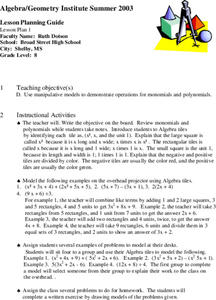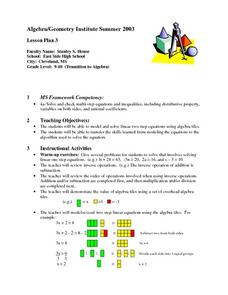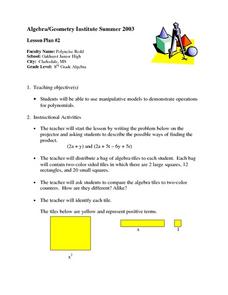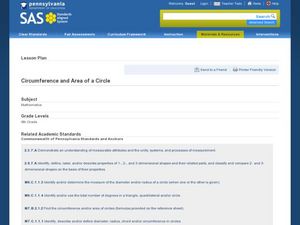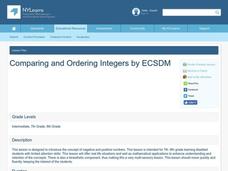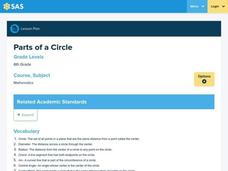Perkins School for the Blind
Volume, Mass, and Density Boxes
Mass and density are difficult topics for kids to understand, and even more difficult when you have visual impairments or blindness. Learners will make boxes and fill them with cotton, sand, or crushed paper. They will feel the density...
Curated OER
Chance (Probability) Operations in Dance Composition -
Eighth graders investigate modern-dance choreographer Merce Cunningham's historically significant contribution to dance-making history. Specifically, 8th graders explore and practice Merce Cunningham's choreographic use of chance...
Curated OER
Polynomials and Factoring
Learners classify, add, subtract, and factor polynomials. In this polynomials instructional activity, students classify polynomials by creating their own system. During a discussion, the class decides on a common system. They add and...
Curated OER
Line Symmetry
Fourth graders identify line symmetry. In this geometry activity, 4th graders are given various pictures and identify if they are symmetrical. Students search through magazines for symmetrical pictures.
Curated OER
Mathematics: Technology and Connections
Sixth graders interpret and replicate patterns. In this patterns lesson, 6th graders are given an item with a definite pattern which they must replicate using a calculator or computer and then justify how they relate. Students listen to...
Curated OER
Polynomials
Eighth graders investigate the concepts and combining them into polynomials. The teacher uses direct instruction for delivery. They can use Algebra to make this lesson hands-on for the benefit of kinesthetic learners.
Curated OER
Solve and check multi-step equations and inequalities
Young scholars participate in a lesson that is concerned with the solving of multiple step equations and inequalities. The use of algebra tiles translates the information well for the kinesthetic learners. Then the skills are used to...
Curated OER
Operations For Polynomials
Eighth graders investigate how to combine polynomials using different operations. The use of tiles is done in order to accommodate those who are kinesthetic learners. The sequencing of the lesson is easy to follow.
Curated OER
What Is It?
Students explore the likelihood of events. In this logical thinking lesson, 3rd graders are given several scenarios and determine whether the possibility of the described event actually happening is likely, unlikely, or impossible. ...
Curated OER
Understanding Fractions
Fourth graders compare fractions by using skittles and m&ms. In this math lesson, 4th graders explore the size of different fractions by cutting pieces of their pie for visual representation. Additionally, students discuss ways to...
Curated OER
Money and Business
Third graders use play money to complete tasks that allow them to see if the budget they came up with works. In this budget lesson plan, 3rd graders create their own budget and test it out with the play money.
Curated OER
Polymers and Products from Petroleum
Over four sessions, learners survey the production and use of polymers and petroleum products. First, they participate in a kinesthetic activity to demonstrate how polymers act, and review a list of common products made from polymers....
Curated OER
Exploring Altitudes in Math
Students draw and calculate altitudes. They draw the altitude of acute, right and obtuse triangles and calculate the altitude of a triangle using the Pythagorean theorem.
Curated OER
Self-Control
Students participate in a problem solving activity. In this conflict resolution lesson, students sit in a circle and take turns standing up, but two children cannot be standing up next to one another at the same time. Students are...
Curated OER
Extending our Knowledge of Place Value
Students demonstrate their knowledge of place value through auditory, visual, and kinesthetic channels. In this place value lesson, kinesthetic learners work with a partner using both sets of hands to represent 2 digit numbers. Visual...
Curated OER
Finding the Circumference and Area of a Circle
Sixth graders discover what circumference is. In this measurement lesson, 6th graders identify the radius and diameter of different circles. Students discover how to find the area of a circle using the radius and diameter.
Curated OER
Ratio Relationships
Students solve for the different ratio and proportion of a problem. For this geometry lesson, students show their knowledge of how to solve proportional relationships. They convert between percent, decimals and fractions.
Curated OER
Comparing and Ordering Integers
Students compare and order integers on an umber line. In this algebra lesson, students differentiate between positive and negative numbers. They plot point in the correct order on a number line.
Curated OER
Circle Graphs
Sixth graders interpret, create, and display data in a circle graph. In this circle graph lesson plan, 6th graders use a compass, protractors, pizza boxes, and more to create a circle graph and analyze the data they put into it.
Curated OER
Building a Bridge
Third graders discover architecture and functionality by constructing a bridge. In this bridge engineering lesson, 3rd graders utilize cardboard, straws, towel tubes and plastic bottles to create a model bridge similar to ones seen in...
Curated OER
Patterns on Parade
First graders discover that patterns exist in sounds, movement, and objects. In this patterns lesson, 1st graders select two items from a group and produce an alternating pattern.
Nazareth College
Cooperation and Conflict Resolution
Fourth graders participate in a variety of activities designed to promote cooperation and positive conflict resolution. In cooperative groups, they create a comic strip or poster, play cooperative musical chairs, write a journal entry...
Curated OER
Balance or Tilt?
Sixth graders investigate the concepts of a variable, constant, expressions, and equations. They solve problems which require the interpretation of expressions in and out of equations looking for solutions. Students also use a balance...
Curated OER
Parts of a Circle
Sixth graders use yarn, paper plate, and other materials to identify parts of a circle. In this parts of a circle lesson plan, 6th graders identify the circumference, radius, diameter, and other parts of a circle.







